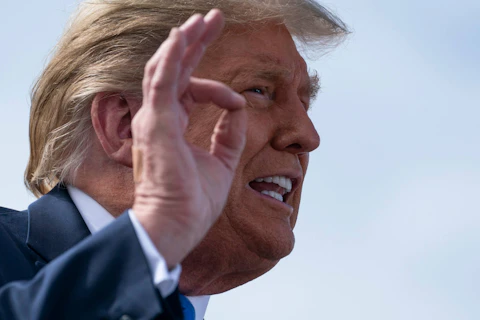President Trump’s latest remarks about accepting this year’s election results were shocking, but are nothing new. His inconsistency on the issue goes back to 2016.
On Wednesday, President Donald Trump announced that he would not commit to leaving office should the 2020 election be legally disputed. He doubled down on those comments again on Thursday.
While Trump’s latest statements were shocking, they were only the latest example of Trump flip-flopping on whether or not he would accept election results.
“We’re going to have to see what happens,” the president said when pressed about a peaceful transfer of power at a briefing on Wednesday afternoon. He then went on to repeat factually inaccurate statements about mail-in voting.
Trump’s statements set in motion a flurry of commentary from politicians on Thursday, with White House Press Secretary Kayleigh McEnany asserting that President Trump would accept the result of a “free and fair election.”
Despite the reassurances from McEnany and several Republican members of Congress, Trump’s comments are only the latest in an inconsistent series of pronouncements on the issue of accepting the results of the election.
In fact, since his 2016 presidential campaign, Trump has flip-flopped back and forth on whether he would accept the results of the presidential elections in which he was a candidate. We’ve rounded up just how inconsistent President Trump has been on these issues below.
March 2016: Trump Agrees to Accept 2016 Election Results
During an interview with CNN’s Chris Cuomo in 2016—right before a series of presidential debates with Hillary Clinton—Trump responded to comments he made that suggested he would cast doubt on whether the election process was fair.
“If I don’t make it, I will go off into the wild blue yonder and I will enjoy the rest of my life. It’ll be a lot easier,” the then-Republican presidential nominee said.
October 2016: Trump Decides That He’s Not Sure He Will Accept the 2016 Election Results
Months later, during the third presidential debate against Democratic presidential nominee Hillary Clinton Trump contradicted himself.
“Are you saying that you’re not prepared to commit to that principle?” Fox News anchor Chris Wallace, who moderated the debate, asked.
“What I’m saying is, I’ll tell you at the time. I’ll keep you in suspense,” Trump replied.
June 2019: The President Declares His Support for the 2020 Election Results
In June 2019, when discussing the 2020 presidential election, the president told Meet The Press anchor Chuck Todd that he would accept the results.
“You will accept the results,” Todd pressed.
“Sure,” the president said with a shrug.
“Whatever happens in 2020,” Todd continued.
“Sure,” Trump replied again.
June 2020: Trump Reiterates His Commitment to Respecting the Election Results
A year later, President Trump seemed to maintain the same sentiments—this time in an interview with Fox News host Harris Faulkner.
Faulkner read a statement by Democratic Presidential Nominee Joe Biden that said he believed Trump would “steal the election” and if he didn’t win, the military would escort him from the White House.
“Certainly, if I don’t win, I don’t win,” Trump replied. “I’d go on and do other things. I think it’d be a sad thing for our country.”
July 2020: As the COVID Pandemic Rages, Trump Suggests He May Not Accept the 2020 Election Results
But just a month later, the president told Chris Wallace he wouldn’t accept the results of the 2020 election.
“Are you suggesting that you might not accept the results of the election?” Wallace questioned.
“I have to see. Hillary Clinton asked me the same thing,” Trump replied. “You know what, she’s the one that never accepted it. She never accepted her loss and she looked like a fool.”
September 2020: With Bad Poll Numbers, Trump Threatens to Ignore the Election Results
With less than 40 days until the election, the president has again chosen inflammatory rhetoric that is at odds with the democratic process in the United States.
The American Civil Liberties Union (ACLU) made clear that, legally, the president has little ground on which to stand. “The peaceful transfer of power is essential to a functioning democracy,” ACLU National Legal Director David Cole said. “This statement from the president of the United States should trouble every American.”
The president’s comments come as polls show close races against Democratic presidential nominee Joe Biden in swing states and states that are historically GOP strongholds.
They also come after President Trump admitted that he would push forward with filling a vacancy on the Supreme Court because the court might be called upon to resolve any disputes that arise in the upcoming election.
If confirmed, Trump’s pick would almost certainly ensure a 6-3 conservative majority on the court, including three justices nominated by Trump. Why does that matter?
“I think this will end up in the Supreme Court,” Trump said. “And I think it’s very important that we have nine justices.”




